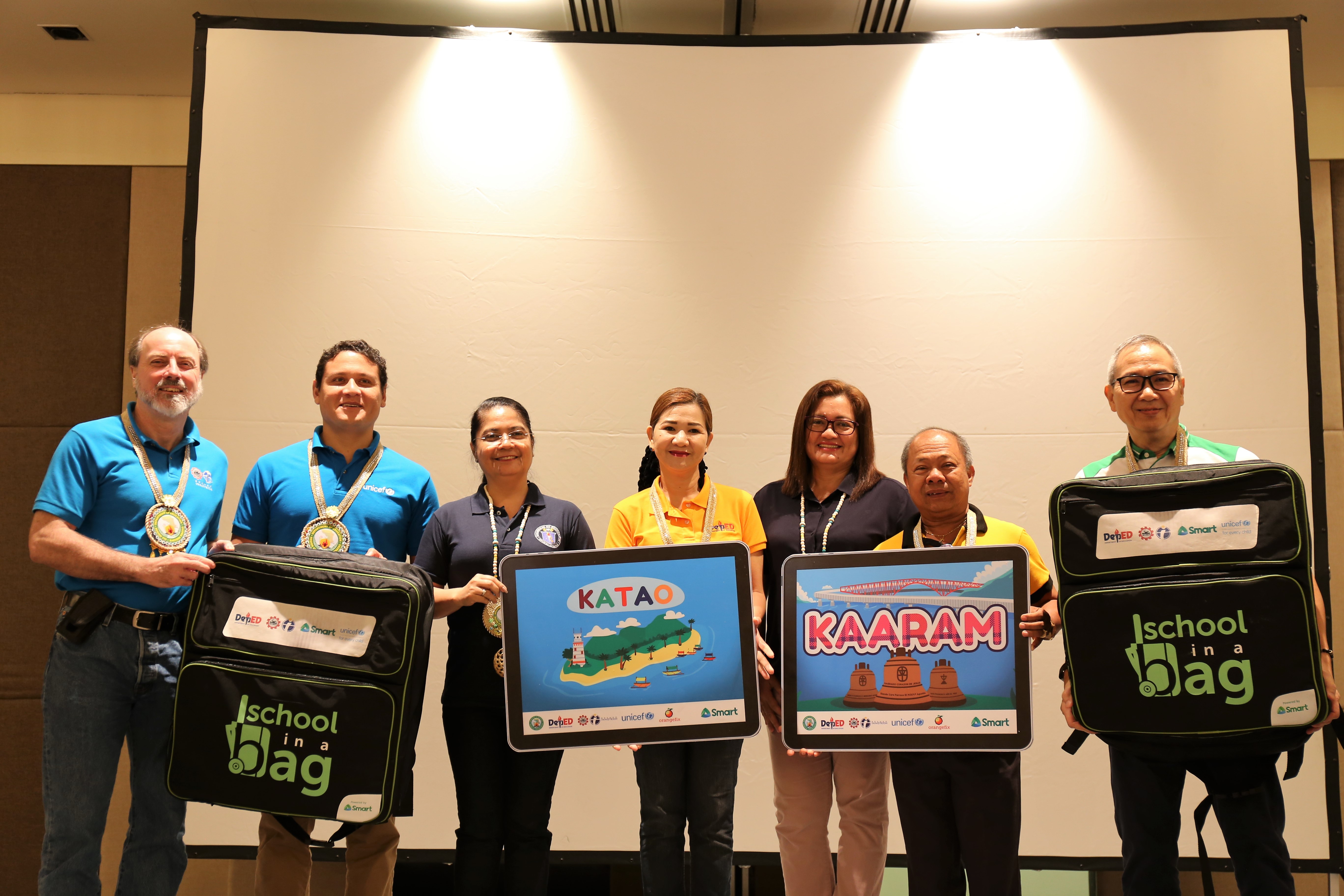Unicef’s ‘school-in-a-bag’ seen to improve learning in Region 8

Unicef and partners Seameo Innotech and Smart Communications turn over school-in-a-bag kits to 50 multigrade schools in Northern Samar and Samar. This is part of Unicef’s support to the Department of Education (DepEd) to improve the quality of education in multigrade schools in the Philippines. From left, Philip J. Purnell, manager, Educational Research and Innovation Office, Seameo Innotech; Isy Faingold, Unicef Philippines Chief of Education; Dr. Leila P. Areola, Director IV, Bureau of Learning Delivery, DepEd; Dr. Mariza S. Magan, Schools Division Superintendent, DepEd – Division of Samar; Dr. Carmela R. Tamayo, Schools Division Superintendent, DepEd – Division of Northern Samar; Dr. Alejandrito L. Yman, Chief of Curriculum and Learning Management Division, DepEd – Region VIII; and Mr. Ramon R. Isberto, Public Affairs Group Head, Smart Communications
TACLOBAN, Philippines – Schools in Samar and Northern Samar received on Saturday digital learning packages to help improve student learning in multigrade classes through the ‘school-in-a-bag’ program of Unicef.
Unicef and its partners: the Department of Education (DepEd), PLDT-Smart and SEAMEO-Innotech, turned over 50 portable and digital classroom packages to select schools that cater to multigrade classes.
Multigrade classes are inclusive systems wherein children with different developmental levels, abilities and needs mix and learn together in one classroom under the guidance of one teacher.
Each school-in-a-bag package equips classes with a projector, a teacher laptop and tablet in one, five student tablets, a DVD player, a USB memory drive, and a pocket wifi with starter load.
About 2,500 disadvantaged school children will stand to benefit from the project.
“Today’s turnover of school-in-a-bag packages aims to bring 21st century learning to all children, particularly for learners from isolated and indigenous poor communities. This is part of our long-standing commitment that every Filipino child realizes their right to quality education,” Unicef representative Julia Rees said.
“It is a timely initiative that will help improve learning opportunities for disadvantaged and vulnerable children. It marks an important milestone in our partnership with DepEd and the private sector and we look forward to replicating the project in other parts of the country where it is needed most” she added.
As the project’s technology partner, PLDT-Smart developed a learning app in the Waray and Ibakon languages, and packaged customized, relevant e-learning resources for tablets and laptops. These were based on the review and feedback from multigrade teachers and implementers who completed a training on Contextualization of Multigrade Teach-Learn Material in Region 8 in February 2018.
As an implementing partner, SEAMEO-Innotech has been helping improve access to quality learning by coordinating and organizing activities with the DepEd.
Unicef has been working to promote quality and inclusive lifelong learning for all Filipino children.
In Region 8, Unicef has been supporting DepEd in reviewing and strengthening the delivery of its multigrade program.
This partnership aims to provide better access to quality education to students in multigrade classes, especially children from poor, isolated and conflict-affected areas. These efforts support in achieving Sustainable Development Goal 4 of providing equitable access to quality elementary education for all children.
About 2.8 million school-aged Filipino children are not in school or enrolled in alternative learning options due to the lack of schools, teacher absenteeism, run-down facilities and the lack of inclusive learning set-up for children from indigenous communities or for children with disability.
Samar and Northern Samar form part of Unicef’s geographical priority areas where some of the most disadvantaged children are.
Priority areas also include Western Samar, Zamboanga del Norte, and the five provinces in BARMM, namely, Basilan, Lanao del Sur, Maguindanao, Sulu and Tawi-Tawi. (Editor: Cenon B. Bibe Jr.)